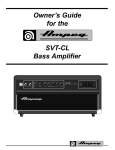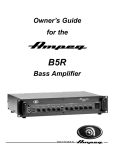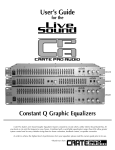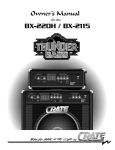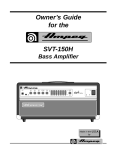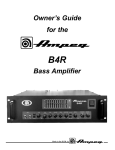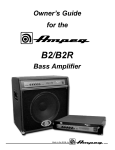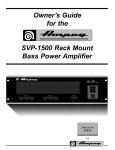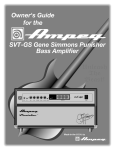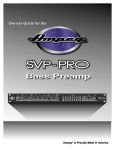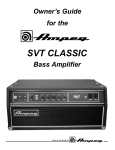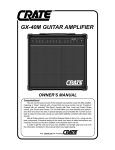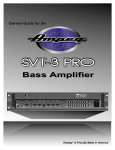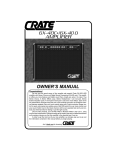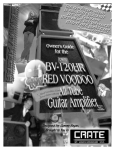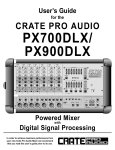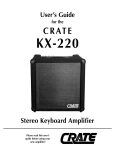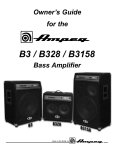Download Asus E9159 Graphics Tablet User Manual
Transcript
Owner’s Manual for the BT-350 Bass Amplifier BT-350 ThunderBass Amplifier Congratulations! You are now the proud owner of one of the most advanced bass guitar amplifiers available, the Crate BT-350 ThunderBass amp. This flexible and compact unit combines a tube preamp, 7-band graphic equalizer, chorus, biamp capabilities and 350 watts of power in a rugged and attractive package that can be rack-mounted in only three spaces. A wide array of front-panel controls along with footswitch options allow you to “tailor” the sound to best suit your personal needs. Like all Crate products, your BT-350 ThunderBass amp is Musician Made in the U.S.A., using only the best components. Extensive testing at many stages in its production, including a final “audition” by a skilled musician, insures you that your BT-350 ThunderBass amp is the best it can be. In order to get the best possible performance, please read this manual before you use the amplifier. . And thank you for choosing Contents: Introduction . . . . . . . . . . . . . . . . . . . . . . . . . . . . . . . . . . . .3 Features . . . . . . . . . . . . . . . . . . . . . . . . . . . . . . . . . . . . . . .3 The Front Panel . . . . . . . . . . . . . . . . . . . . . . . . . . . . . . .4, 5 The Rear Panel . . . . . . . . . . . . . . . . . . . . . . . . . . . . . . . . .6 System Block Diagram . . . . . . . . . . . . . . . . . . . . . . . . . . . .7 Using the Biamp Capabilities . . . . . . . . . . . . . . . . . . . . . .8, 9 Some Suggested Settings . . . . . . . . . . . . . . . . . . . . . .10, 11 Technical Specifications . . . . . . . . . . . . . . . . . . . .back cover CAUTION ATTENTION VORSICHT RISK OF ELECTRIC SHOCK DO NOT OPEN RISQUE D'ELECTROCUTION NE PAS OUVRIR ELEKTRISCHE SCHLAGGEFAHR NICHT OFFENEN CAUTION: TO REDUCE THE RISK OF ELECTRIC SHOCK, DO NOT REMOVE COVER. NO USER-SERVICEABLE PARTS INSIDE. REFER SERVICING TO QUALIFIED SERVICE PERSONNEL. ATTENTION: POUR REDUIRE D'ELECTROCUTION NE PAS ENLEVER LE COUVERCLE. AUCUNE PIECE INTERNE N'EST REPRABLE PAR L'UTILISATEUR. POUR TOUTE REPARATION, S'ADRESSER A UN TECHNICIEN QUALIFIE. VORSICHT: ZUR MINIMIERUNG ELEKTRISCHER SCHLAGGEFAHR NICHT DEN DECKEL ABENHMEN. INTERNE TEILE KONNEN NICHT VOM BENUTZER GEWARTET WERDEN. DIE WARTUNG IS QUALIFIZIERTEM WARTUNGSPERSONAL ZU UBERLASSEN. THIS EQUIPMENT HAS BEEN DESIGNED AND ENGINEERED TO PROVIDE SAFE AND RELIABLE OPERATION. IN ORDER TO PROLONG THE LIFE OF THE UNIT AND PREVENT ACCIDENTAL DAMAGES OR INJURY, PLEASE FOLLOW THESE PRECAUTIONARY GUIDELINES: CAUTION: TO REDUCE THE RISK OF ELECTRIC SHOCK, DO NOT OPEN CHASSIS; DO NOT DEFEAT OR REMOVE THE GROUND PIN OF THE POWER CORD; CONNECT ONLY TO A PROPERLY GROUNDED AC POWER OUTLET. WARNING: TO REDUCE THE RISK OF FIRE OR ELECTRIC SHOCK, DO NOT EXPOSE THIS EQUIPMENT TO RAIN OR MOISTURE. CAUTION: NO USER-SERVICEABLE PARTS INSIDE. REFER SERVICING TO QUALIFIED SERVICE PERSONNEL. CAUTION: OUR AMPLIFIERS ARE CAPABLE OF PRODUCING HIGH SOUND PRESSURE LEVELS. CONTINUED EXPOSURE TO HIGH SOUND PRESSURE LEVELS CAN CAUSE PERMANENT HEARING IMPAIRMENT OR LOSS. USER CAUTION IS ADVISED AND EAR PROTECTION IS RECOMMENDED IF UNIT IS OPERATED AT HIGH VOLUME.THE CHART BELOW SHOWS THE U.S. GOVERNMENT OCCUPATIONAL SAFETY AND HEALTH ADMINISTRATION (OSHA) REGULATIONS WHICH WERE IN EFFECT AT THE TIME OF THIS PUBLICATION FOR PERMISSIBLE NOISE EXPOSURE, PER 29CRF1910, TABLE G-16. SOUND LEVEL dBA SLOW RESPONSE DURATION PER DAY IN HOURS SOUND LEVEL dBA SLOW RESPONSE DURATION PER DAY IN HOURS 90 92 95 97 100 8 6 4 3 2 102 105 110 115 1-1/2 1 1/2 1/4 or less ACCORDING TO OSHA, ANY EXPOSURE IN EXCESS OF THOSE LISTED ABOVE COULD RESULT IN SOME HEARING LOSS. EXPLANATION OF GRAPHICAL SYMBOLS: 2 "DANGEROUS VOLTAGE" = "DANGER HAUTE TENSION" "GEFAHLICHE SPANNUNG" "IT IS NECESSARY FOR THE USER TO REFER TO THE INSTRUCTION MANUAL" = "REFERREZ-VOUS AU MANUAL D'UTILISATION" "UNBEDINGT IN DER BEDIENUNGSANLEITUNG NACHSCHLAGEN" BT-350 ThunderBass Amplifier Introduction: The Crate BT-350 ThunderBass amp is a high-quality bass guitar amplification system that combines extremely high power with very desirable features. Each feature and control is discussed in detail in the sections entitled “The Front Panel,” “The Rear Panel” and “Using the Biamp Capabilities.” Crate offers a heavy-duty three rack space enclosure (Crate model #CR-3) which will house the BT-350 perfectly, providing the extra protection and convenience needed when you take your Crate on the road. Also available is a five rack space enclosure (Crate model #CR-5) which is ideal for use when the BT-350 is combined with a second amplifier for biamping. The BT-350 is equally suited for use in the club, the studio or on the stage. When combined with Crate’s line of superior bass cabinets, the results are nothing less than phenomenal. (But then, what else would you expect from Crate?) Features: Additional information can be found on the pages indicated. • Tube Preamp: Adjustable Drive control. Low, Mid and High frequency controls. Low and High Boost switches. Normal (0dB) and padded (-15dB) input jacks. (page 4) • Graphic EQ: 7 bands. 40Hz to 10kHz. 12dB cut or boost. Master Level control. Footswitch controllable. LED Indicator. (pages 4 and 5) • Master Level: Peak (overdrive) LED indicator. Switchable Limiter circuit with LED indicator. (page 4) • Chorus: Adjustable Depth and Rate controls. Variable cut-off (“Spectrum”) control. (page 5) • Biamp: Adjustable crossover frequency control. Low-to-high balance control. Independent Line Out level control. Balanced (XLR) and unbalanced (1/4”) outputs. (pages 5 and 6) • Internal Amplifier: 350 watts into 4 ohms. 1/4” mono speaker output jacks. Extensive heatsinking. Detachable AC power cord. (page 6) • Effects Loop: 1/4” Send and Return jacks. Allows use of external signal processors. Return jack doubles as input for power amp in Biamp mode. (page 6) • Musician made in the U.S.A. • Crate’s exclusive 5-year warranty (U.S. only, – see your dealer in other areas for warranty information) 3 BT-350 ThunderBass Amplifier The Front Panel: INPUTS: 1. 0dB INPUT: Connect your bass here using a shielded instrument cable. The output signal of your bass will run full-strength into the amplifier, which is fine for most basses having passive electronics and/or low-output pickups. If your bass has active on-board electronics and/or active pickups, use the -15dB input jack (#2) to avoid overloading the amp’s input stage. 2. -15dB INPUT: Connect your bass here if it has active on-board electronics and/or active pickups. The bass’s output signal will be attenuated by 15dB to keep it from overloading the amplifier’s input stage. NOTE: Even if your bass has passive electronics, if the Peak LED (#9) flashes at seemingly low levels when you’re plugged into the 0dB input, try using the -15dB jack instead. TUBE PRE-AMP section: 3. TUBE DRIVE: This serves as the gain control for the BT-350’s tube preamp section, which gives you the natural compression of a tube amplifier. For the best compression. adjust the Tube Drive control as you strike your strings (hard). Watch the Peak LED (#9): when the LED starts to flash, you’ve reached a choice setting for the best signal-to-noise ratio and “tube feel.” 4. LOW BOOST: Switch on the Low Boost and you’ll feel a large increase in the very lowest bass notes, especially noticeable when you hit the low B string of a five or six-string bass. This is due to 4 the impressive 8dB of gain added at 20Hz, increasing the deep, “floor-shaking” sounds of your instrument. 5. LOW: Adjust the output level of your low-bass tones with this control: the center position is “flat” (no boost or cut). Turning the control to the left reduces the low frequency output; turning to the right increases the low frequency output. The Low control primarily affects the notes you feel, providing up to 13dB of boost or cut at 40Hz. 6. MID: Adjust the output level of your upper-bass tones with this control: the center position is “flat” (no boost or cut). Turning the control to the left reduces the upper-bass output; turning to the right increases the upper-bass output. The Mid control provides up to 11dB of boost or cut at 260Hz, which changes the “voice” of your instrument’s sound. By boosting the Mid control you can make the sound of your bass cut through the rest of the band, without getting a whole lot louder. 7. HIGH: Adjust the amount of high-frequency overtones with this control: the center position is “flat” (no boost or cut). Turning the control to the left reduces the high-frequency output; turning to the right increases the high-frequency output. The High control allows up to 15dB of boost or cut at 5kHz, which allows you to adjust the “crispness” of the sound of your bass. Players looking for a sharp, slapping sound may tend to want this control turned up farther than those who seek a more traditional sound. 8. HIGH BOOST: Turning on the High Boost greatly enhances the upper-harmonic overtones of your bass, increasing such subtleties as the sounds of your fingers on the strings or the strings striking the fretboard. High Boost produces an additional 10dB of gain at 10kHz, making the “crisp” characteristics of your bass even more pronounced. MASTER LEVEL SECTION: 9. PEAK LED: This LED indicator will light when you’re nearing the highest desirable level for your input signal and are in danger of overdriving the preamp’s solid state circuitry. (This can cause the output of the amplifier to sound distorted.) To get the maximum benefit from the BT-350’s tube preamp section (good, clean sound with the “feel” of natural tube compression), adjust the Tube Drive control (#3) until this LED begins to flash when you’re hitting your strings pretty hard. 10. MASTER LEVEL: This is the BT-350’s master volume control. The output level of the amplifier through your main speakers, the Biamp Outputs and the Effects Loop Send are simultaneously adjusted by this control: at the full-left position there will be no output; rotating the control to the right increases the volume level. BT-350 ThunderBass Amplifier The Front Panel (con’t): 11. LIMIT LED: The BT-350 offers a special limiting circuit which helps to keep the output of the amplifier “clean” when played at extreme volume levels. When the Limiter is engaged, the Limit LED will come on as the power amp is being driven to full output. 12. LIMITER: When a power amplifier reaches maximum output levels, it may begin to “clip” its output signal, which generates potentially speaker-damaging distortion. The BT-350 has a special APM (Automatic Power Maximizer) limiting circuit which helps minimize this problem by monitoring the power amp’s output signal, keeping it below clipping. This feature insures you that even as you push your amplifier to its full 350-watt output, the sound will remain clean and pure. To activate the limiter circuit, press the Limiter switch in until it locks in place. The limit LED (#11) lights up when the APM circuit is actually limiting the signal. NOTE: The limiter may be defeated, which allows higher power output, but there may be more distortion than the .2% shown in the specifications chart. BIAMP section: 13. FREQUENCY: This sets the crossover point when using the BT-350 in the biamp mode (using two power amplifiers, one for the low frequencies, one for the highs). Please see the section entitled “Using the Biamp Capabilities” on pages 8 and 9 for more details about biamping. 14. BALANCE: This adjusts the relative level between the low frequency and the high frequency biamp output signals. Please see the section entitled “Using the Biamp Capabilities” for more details 15. LINE OUT LEVEL: This adjusts the output level for the Line Outputs jacks on the rear panel (#31, 32), separately and independently from the amplifier’s Master level control (#10). The line out feature can be used to send a low-level (pre-amplified) signal to a mixing board, recorder or external power amp. The Line Out signal will have the same tone and Chorus information as the Master Level (speaker output) signal. Turning the Line Out Level control to the right increases the output level; to the left decreases it. NOTE: The Line Level signal is preEffects Loop and therefore will not be affected by any external signal processors connected to the Loop (see #33 and 34). 16. POWER: This heavy-duty rockertype switch is used to turn the amp on in the “up” position, off when “down.” The switch lights up when the power is on. 17. FOOTSWITCH: A two-button footswitch (such as Crate’s CFP-2) can be plugged in here to give you remote on/off control of the graphic eq and the chorus. When connected, the footswitch overrides the front panel on/off switches for these features. NOTE: This is a stereo 1/4” jack: “ring” controls the chorus, “tip” controls the eq, and the “sleeve” is ground. Use only a footswitch equipped with a stereo plug (such as Crate’s CFP-2). EQUALIZATION section: The graphic equalizer can be used in two different ways: 1: To fine-tune your sound, make small adjustments at the desired frequencies and leave the EQ on for the entire performance; 2: For a completely different sound, make larger adjustments and only switch the EQ on when you want the radical change (such as during bass solos). 18. LEVEL: This serves as the overall volume control for the BT-350’s onboard 7-band graphic equalizer, and only affects the signal when the EQ is on (see #20). Use this control to adjust the volume of the equalized signal: pulling the Level control down from the center position reduces the volume, pushing it up from center increases it. The center detent is “flat” (no increase or decrease in level). 19. 40Hz – 10kHz: These slide controls allow you to vary the output at the frequencies shown under each control by ±12dB. The center position of each control is “flat” (no boost or cut): pushing a control up from center boosts the output at its given frequency; pulling it down reduces that frequency. The 40Hz and 100Hz controls affect the lower notes of your bass, changing how much bass is felt. 250Hz through 1.6kHz affect the upper notes, modifying the amount of “punch” that comes across. 4kHz and 10kHz affect the upper harmonic overtones of your bass, such as the sounds of your fingers in the strings or the strings striking the fretboard. 20. ON: When this switch is in, the EQ is active, and the settings of the controls affect the sound of your bass. 21. ENABLED LED: This LED will only light when the EQ is activated, showing you that the signal will be affected by the settings of the EQ controls. CHORUS section: 22. ON: When pushed in, the on-board Chorus is activated and the signal produced by your bass will have the Chorus effect applied to it. 23. ENABLED LED: This LED will light when the Chorus is activated, giving you a visual sign that the Chorus is functioning. 24. SPECTRUM: (or “crossover:”) This unique feature allows you to adjust which frequencies – either the entire range or only the upper bass tones – are enhanced by the Chorus effect. In the fully counter-clockwise position the entire range (or “spectrum”) will have the chorus effect. As you rotate the control clockwise you change the roll-off frequency for the Chorus, which allows the lowest tones to come through “dry” (without chorus applied). This is extremely useful for maintaining full lowend impact and definition during live performances. 25. DEPTH: Adjust the overall amount of the Chorus effect with this control: to the left for a little, to the right for a lot. 26. RATE: Adjust the speed of the chorus effect with this control: to the left for slow, smooth “phasing” sounds, to the right for faster, “vibrato” sounds. 5 BT-350 ThunderBass Amplifier The Rear Panel: 27. SPEAKER OUTPUT jacks: Using a 1/4” mono phone plug, connect the output of the BT-350 to your speaker cabinet(s) via these jacks. Be sure to use heavy gauge speaker cable – not instrument patch cords – for these connections. These jacks are wired in parallel: when connecting your speakers, keep the total impedance at or above 4 ohms. The chart below can help you determine the total impedance load when connecting various combinations of speakers in parallel. SPEAKER IMPEDANCE NUMBER OF SPEAKERS TOTAL IMPEDANCE 4 OHMS 1 4 OHMS 8 OHMS 1 8 OHMS 8 OHMS 2 4 OHMS 16 OHMS 2 8 OHMS 16 OHMS 4 4 OHMS 28. AC Line cord: Firmly plug the supplied, heavy-duty grounded power cord into this receptacle. When in use, be sure this cord is properly plugged into a safely-wired, grounded 120 volt, 60Hz AC power outlet. Do not attempt to defeat the ground connection on this cable! If your BT-350 was purchased outside of the United States, see the unit’s rear panel for its power rating and follow the above guidelines. BIAMP OUTPUTS: 29. HIGH OUT: When used in the biamp mode, this output connects to the 6 high-frequency power amplifier. See the section entitled “Using the Biamp Capabilities” on pages 8 and 9 for details. 30. LOW OUT: When used in the biamp mode, this output connects to the lowfrequency power amplifier. See the section entitled “Using the Biamp Capabilities” on pages 8 and 9 for details. NOTE: You may access the BT-350’s internal power amp through the Effect Return jack (#34), for either the high or low signal. This is covered in the section entitled “Using the Biamp Capabilities” on pages 8 and 9. LINE OUTPUTS: 31. UNBALANCED: This 1/4” mono phone jack supplies an unbalanced output signal for connecting to an external power amplifier. Very short runs (under 20’) to a mixer or recorder having unbalanced inputs can also be made from this jack; for longer runs use the Balanced output (#32). The output level at this jack is adjusted by the Line Out Level control (#15) on the front panel. 32. BALANCED: This XLR-type connector supplies a balanced signal for connecting to an external mixer, recorder or power amp which has balanced inputs. The output is adjusted by the Line Out Level control (#15). Use the Balanced output when the distance between the BT-350 and the mixing console or recorder is over 20’. NOTE: The Balanced Output jack is wired as follows: PIN 1: GROUND PIN 2: POSITIVE (+) PIN 3: NEGATIVE (–) EFFECTS LOOP: 33. SEND: When using an external signal processor with the BT-350, connect a shielded cable between the Send jack of the amplifier and the input of the effects unit. This “sends” the pre-amplified bass signal to the device for processing. 34. RETURN: When using an external signal processor, connect a shielded cable between the output of the effects unit and the Return jack of the amplifier. This “returns” the processed bass signal to the BT-350’s internal amplifier. BT-350 ThunderBass Amplifier System Block Diagram: 7 BT-350 ThunderBass Amplifier Using the Biamp Capabilities: Your BT-350 can be used along with an additional power amplifier, to “biamp” your system: that is, using two amplifier/speaker combinations to share the task of reproducing the full range of your bass. Due to increased efficiencies, the combined output may sound cleaner and more powerful than that of a single-amped system, especially during high-volume, live performances. Using the BT-350 as the low-frequency power amplifier: In the biamp configuration shown below, the BT-350 serves as the system preamp, biamp crossover, and low-frequency power amplifier. A second power amp of 75 to 200 watts (such as the Crate model SPA-200) may be used to amplify the upper frequencies. The crossover frequency (that point where one amplifier ends and the other amp takes over) is set by adjusting the BT-350’s Biamp Frequency control (#13). To connect the unit for biamp operation using the BT-350 as the low-frequency power amp, refer to the diagram below: 1 Connect a shielded cable from the BT-350’s Biamp HIGH OUT jack and the input of the amplifier which will be used for the upper frequencies. 2 Connect a shielded cable from the BT-350’s Biamp LOW OUT jack and its Effects Loop RETURN jack. 3 Connect the Speaker Outputs of your high-frequency power amp to the speaker cabinet(s) that will be used to reproduce the upper frequencies. (10” or 12” drivers work well for this.) 4 Connect the Speaker Outputs of the BT-350 to the speaker cabinet(s) that will be used to reproduce the low bass notes. (Woofers in the 15” to 18” range work well for these low notes.) Use the BT-350’s Balance control (#14) to adjust the relative level of lows to highs: to increase the level of low frequencies in the mix, rotate the Balance control to the left (towards “LOW”). To increase the amount of highs in the mix, rotate the control to the right (towards “HIGH”). 8 BT-350 ThunderBass Amplifier Using the Biamp Capabilities (con’t): Using the BT-350 as the high-frequency power amplifier: In the biamp configuration shown below, the BT-350 serves as the system preamp, biamp crossover, and high-frequency power amplifier. A second power amp of 200 to 500 watts may be used to amplify the low frequencies. The crossover frequency (that point where one amplifier ends and the other amp takes over) is set by adjusting the BT-350’s Biamp Frequency control (#13). To connect the unit for biamp operation using the BT-350 as the high-frequency power amp, refer to the diagram below: 5 Connect a shielded cable from the BT-350’s Biamp LOW OUT jack and the input of the amplifier which will be used for the low frequencies. 6 Connect a shielded cable from the BT-350’s Biamp HIGH OUT jack and its Effects Loop RETURN jack. 7 Connect the Speaker Outputs of your low-frequency power amp to the speaker cabinet(s) that will be used to reproduce the low bass notes. (Woofers in the 15” to 18” range work well for these low notes.) 8 Connect the Speaker Outputs of the BT-350 to the speaker cabinet(s) that will be used to reproduce the upper bass notes. (10” or 12” drivers work well for this.) Use the BT-350’s Balance control (#14) to adjust the relative level of lows to highs: to increase the level of low frequencies in the mix, rotate the Balance control to the left (towards “LOW”). To increase the amount of highs in the mix, rotate the control to the right (towards “HIGH”). 9 BT-350 ThunderBass Amplifier Some Suggested Settings: ROCK: Biamp and Chorus controls optional. You can crank the Tube Drive even more for distortion; if you do, back off the EQ level. JAZZ: This will produce a very smooth sound with a minimum of percussive tones. 10 BT-350 ThunderBass Amplifier Some Suggested Settings: COUNTRY: Increasing the EQ Level produces more clean volume. Set the Master Level to taste. FUNK “POPPING”: Chorus is a great effect with this setting. 11 BT-350 ThunderBass Amplifier Technical Specifications: Output Power Rating 350 watts @ 0.2% THD, 4 ohm load – 120VAC 200 watts @ 0.2% THD, 8 ohm load – 120VAC Gain @ 1kHz 61dB, tones at “5” Tone Control Range Low Boost Low Mid High High Boost +8dB @ 20Hz ±13dB @ 40Hz ±11dB @ 260Hz ±15dB @ 5kHz +10dB @ 10kHz Graphic EQ Level +8dB, -10dB Graphic EQ Range ±12dB @ 40Hz, 100Hz, 250Hz, 625Hz, 1.6kHz, 4kHz, 10kHz Signal to Noise Ratio 84dB typical Input Impedance 0dB input: 1M ohm -15dB input: 122k ohm Maximum Signal Level Accepted 0dB input: 2.5V peak to peak -15dB input: 14V peak to peak Tube Type: 12AX7 (preamp) Effects Loop Level 1V RMS for full power output Power Requirements Domestic Export 120VAC, 60 Hz, 10A 240VAC, 50 Hz, 5A Size and Weight 5.25”H x 19”W x 15.75”D, 36 lbs. CRATE continually develops new products, as well as improves existing ones. For this reason, specifications and information in this manual are subject to change without notice. CRATE/SLM ELECTRONICS, A DIVISION OF ST. LOUIS MUSIC, 1400 FERGUSON AVENUE, ST. LOUIS, MO 63133 47-599-02 • 02-96












